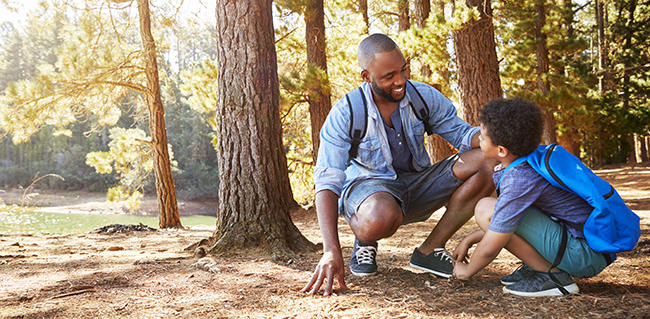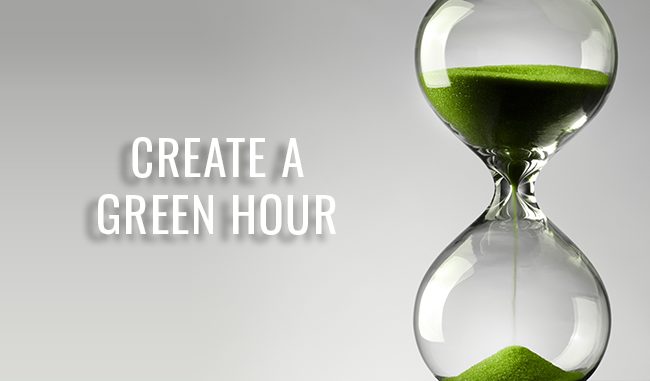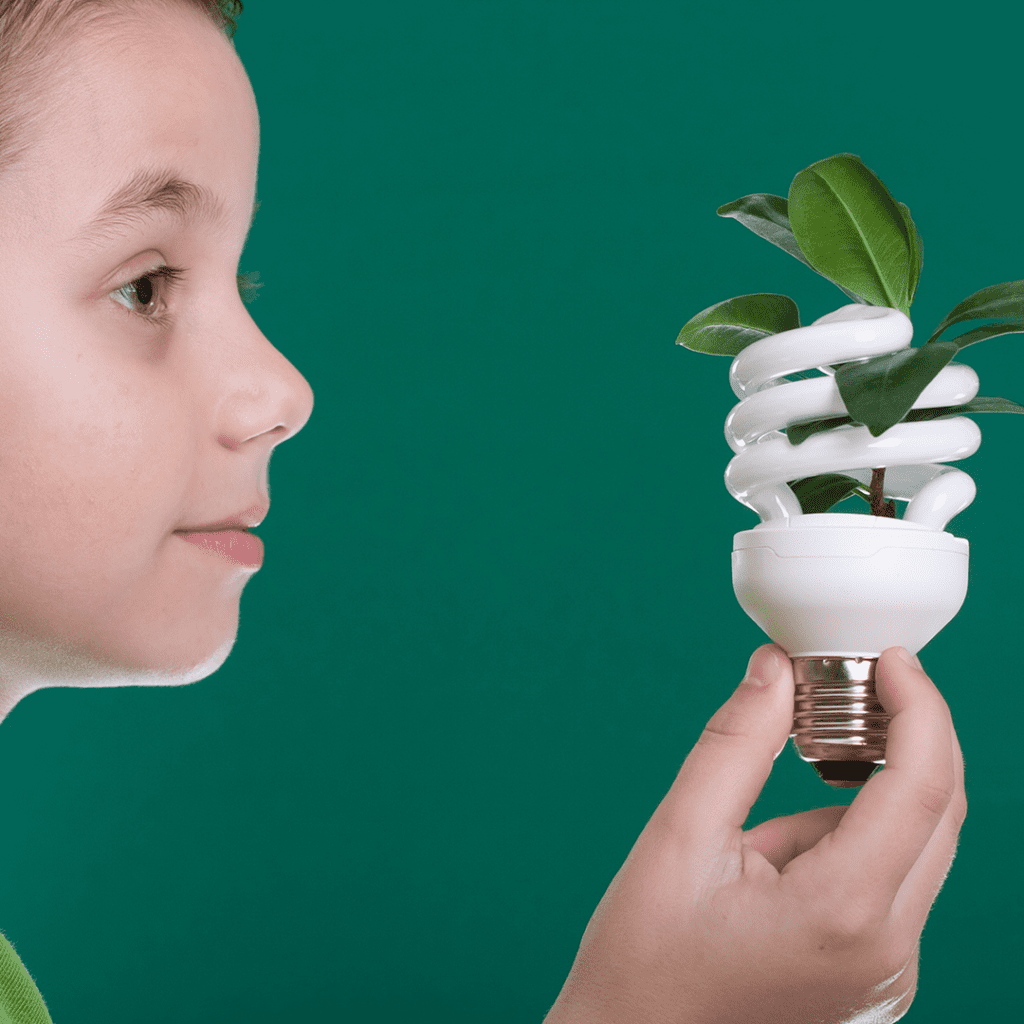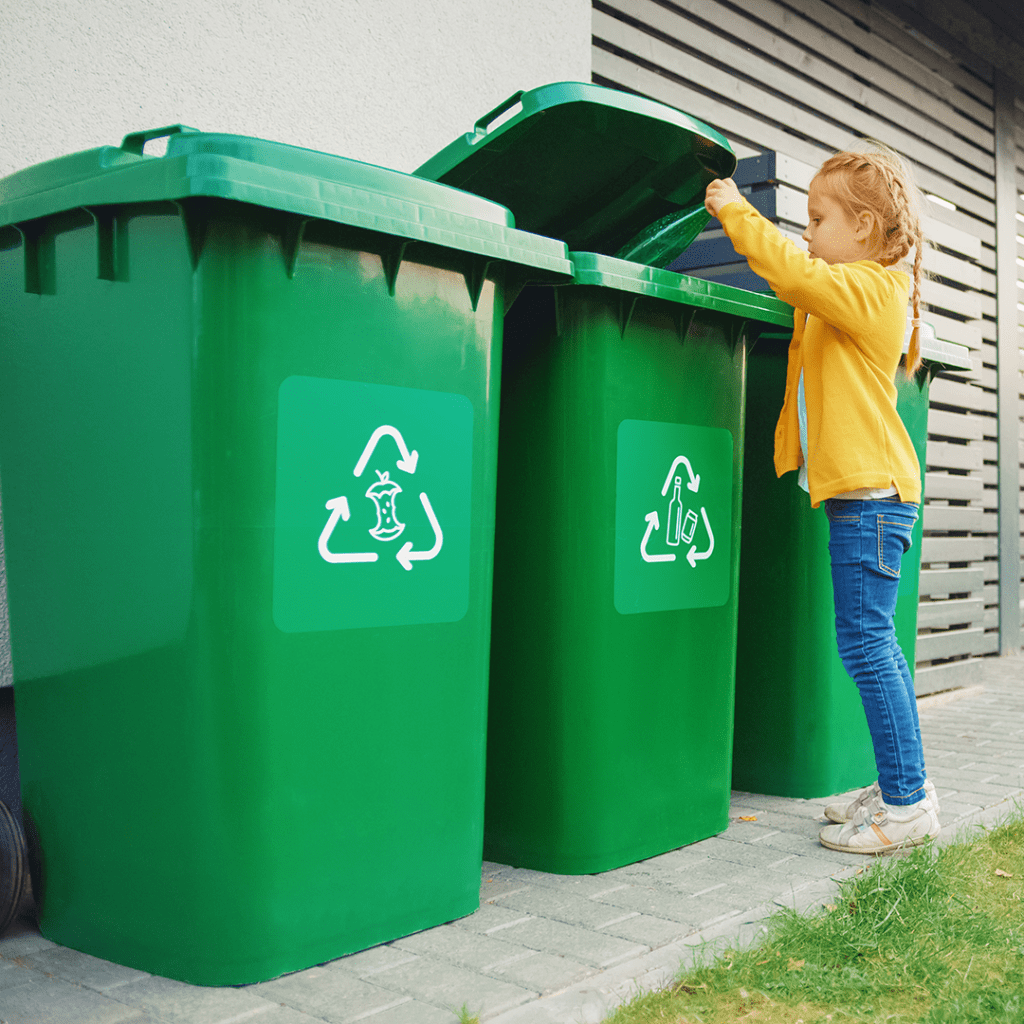Bringing Up Children to Care About the Planet
Living a greener life that demonstrates care for the planet also benefits the health and wellness of our families. Yet, being eco-conscious has become a hotly debated topic tied to identity politics and financial gain—to the detriment of the future of our children and earth itself.
Living an eco-conscious life can seem complicated and arduous at times…not to mention expensive! From recycling to mindful shopping, from non-toxic cleaning to earth-friendly habits, we have more information than ever to inform an eco-conscious life.
To take some of the potential overwhelm out of the equation, here's a selection of simple ways to build your families’ eco-consciousness and social responsibility without breaking the bank.
Cultivate a Love of the Outdoors
The most direct indicator of being eco-conscious is having participated in nature activities as kids. “It really helps to get kids outdoors early in their lives and as often as possible,” president and CEO of the National Wildlife Federation, Collin O’Mara wrote. “Experiences children have while gardening and creating habitats, conducting bird and plant counts, walking on adventurous trails, visiting parks and wetlands and more create lasting connections and put kids on a path towards protecting the world around them.”
Getting kids away from screens and outside into the fresh air is an increasing challenge. Start small by stopping at a park on the way home from school, eating dinner outside, or photographing backyard wildlife. It’s a combination of multiple experiences, rather than one life-changing experience, that produces environmentally literate people. Focus on exploration and appreciation of what’s nearby to pique a genuine interest in what takes place around them.

By weaving outdoor experiences into your daily living, your children will begin to associate their environment with their interests and happiness. Then you can build in more time for taking weekend hikes together or outings to a lake or ocean. A zoo, state park or aquarium will put you quickly in touch with nature. And, as a bonus, they often do a little environmental consciousness raising.
Engaging children’s interests in the outdoors and allowing them to explore – climb trees, look at bugs, admire wildlife – will provide a first-hand experience of how all living things are connected. Reinforcing their interests and natural curiosity will allow them to discover what they love about the environment around them and foster:
An emotional connection with nature – It’s easier for people, adults and children alike, to care about things they have a direct experience with. And an emotional investment is hard to break – it provides a compelling context for developing sustainable habits. They may adopt more outdoor hobbies and be more interested in walking or biking instead of driving as they get older.
A sense of belonging – Exploring the world around them allows them to develop an understanding of their place in the web of life and the responsibility they have to care about the planet. They will begin to see a link between their experience of the natural world and their belief in their capacity, their self-reliance, and their decision-making.
An appreciation, respect, and care for all living creatures – The best way for young people to recognize the intrinsic worth of all living things is to directly interact with animals and plants in their natural environment. This can start in your own backyard. Help kids plant a garden or tree. Set up bird feeders, a birdbath, or birdhouses. As they water the garden or clean out and refill the bird bath daily, they will learn how to take care to preserve the tenuous balance in nature.
A world-view that we are in this together – The Earth is ours to share with every living thing. The best way to learn the importance of healthy natural resources is to connect their exploration with the source of resources, like clean water, and what they can do to help protect it. When brushing your teeth, turn off the water to save some to share with animals, plants, and other people! Learning to respect natural resources and appreciate their importance, not only to yourself but to every other creature, is a lesson that can be extended all through life.
A sense of agency – Kids sometimes bring home new ideas from school or their friends. Listen to those ideas, even if they seem a little harebrained. As you listen to your children and involve them in the decision-making process around eco-consciousness they will develop courage and agency because their feelings, thoughts, and questions were taken seriously and met with empathy and interest by adults.
A healthier life that encourages more movement – The outdoors have long been known to help stress management and promote emotional well-being. Additionally, research shows children who play outside more are in better shape, more creative, less aggressive, and show better concentration.
In all cases, take time to explain to your children the importance of taking care of the earth so generations to come will also be able to enjoy the great outdoors. By fostering a concern for the environment and sustainable habits early, parents can raise children who will not only be more aware of environmental issues, but they will become stewards of the environment!
Set An Example for Caring About The Planet
As in any area of life, children need role-models. “It’s all about setting a good example in the home and the way we live our own lives as parents ― whether that’s recycling, minimizing waste, or paying attention to the amount of electricity and water we consume,” said Bill Ulfelder, executive director of The Nature Conservancy in New York. “Our kids don’t always let us know that they’re watching and listening, but they sure are.”
”If a child is to keep his inborn sense of wonder, he needs the companionship of at least one adult who can share it, rediscovering with him the joy, excitement, and mystery of the world we live in.”
– Rachel Carson
Our children are soaking up everything around them from a very young age. By showing that you care about and respect the environment, your kids will do the same. When adults act in a respectful way towards animals, and even creatures such as spiders, children will receive the message these creatures are entitled to care and protection. Our children depend on us to bring them closer to the problems and demonstrate that what we do or don’t do affects the world around them.
Establish Healthy Habits That Care About the Planet
Simple daily activities make eco-consciousness and social responsibility real and instinctive to kids. By establishing good habits like recycling at a young age, those habits are more likely to stick with kids as they get older. Even a few sustainable habits make a huge impact, and children tend to emulate these habits as adults. Here is a wide selection of habits you could develop with your children.
Water Conservation
- When brushing teeth, turn off the water.
- Use plant selection to teach children about water-saving gardening.
- Show them how to water a lawn and garden properly.
- Demonstrate how important clean water is by drinking filtered tap water in reusable bottles.
Energy Conservation
- Turn off the light when you leave the room.
- Turn off the TV or computers if no one is using them.
- Keep doors to the outside closed so you won’t let air conditioning or heat escape.
- Resist lingering in front of the refrigerator with the door open.
- Replace regular light bulbs with energy-efficient ones.
- Leave the car at home when you can and walk or bike as a family to your destination – this brings together outdoor fun AND clean energy.
Reduce, Reuse, and Recycle
- Evaluate your family’s waste, and play games with your children to be more conscious of using less. Like the EPA says, the best way to reduce waste is to not create it.
- Avoid disposables by reusing things, like dish towels and recyclable containers, to keep items out of landfills.
- Buy rechargeable batteries for electronics and toys. Teach them how to care for and recharge them. This reduces garbage and keeps toxic metals, like mercury, out of landfills.
- Ask kids to gather toys, books, and other goods that they no longer use for donation to local charities. Have them ride along for the drop-off so they can see how groups such as Goodwill and the Salvation Army use donations to help others.
- Passing along and receiving slightly-used items and clothing as hand-me-downs and shopping at second hand stores also saves money. There are many local “Buy Nothing” groups that support communities passing along items which is especially useful for the items kids quickly grow out of.
- Consistently use reusable grocery bags to shop – children interpret that as the normal way of shopping and are more likely to do the same as an adult.
- Teach them how to know which items are recyclable and go into which bin based on your local recycling programs.
- Rather than buying toys that either break or no longer interest your kids attention, take your kids to a museum, art institute, science center, or camping – experiences make great family gifts and future memories that reinforce eco-consciousness and social responsibility!
Eco-conscious consumption
- When shopping for new items, look for things made with minimal packaging and from recycled materials that can be used many times
- Teach your children to research their purchases and give their money to companies that value environmental issues.
- Consider borrowing items that you need sporadically, like party supplies and tools, and maintain the things you already own so they do not need replacement.
Chemicals & Pollutants
When possible, buy organic food. Produce and animal products grown and raised without synthetic pesticides, GMOs, artificial fertilizers, antibiotics and synthetic hormones are numerous. Eating food without chemicals is especially important for our kids because of their rapidly developing bodies
- When buying all organic food is cost-prohibitive, focus on the Dirty Dozen – a list of the top 12 fruits and vegetables, like strawberries and spinach, that are particularly vulnerable to chemicals.
- There are 15 other items, like avocados and pineapple, that you can skip buying organic to save a little money.
Care about the planet by cleaning green. Many natural products can replace commercial, and likely hazardous, cleaning products. It may be hard to tell what is bad for you, as house cleaning products are not required to list ingredients. Here are some green habits for cleaning:
- Deodorize carpets by having your child sprinkling them with baking soda – wait 15 minutes and then vacuum.
- Use vinegar and baking soda for everything from oven cleaning and drain clearing to stain removal and metal polishing. Check out our article about how to Get A Sparkling, Germ-Free Toilet Naturally
- Find recipes to make your own natural cleaning products. Have your child help you make cleaners the same way you might bake with them.
Care about the planet by cutting out single-use plastics. Plastics are omnipresent in our lives because plastic takes a very long time to break down. Plastic accounts for much of the world’s trash and pollution, especially in the ocean. Not to mention that BPA is found in many hard plastics can cause breast cancer and other health problems.
- When you have to use plastic, like your child’s sippy cup, be sure it is marked BPA-free.
- Switch your family over to stainless steel water bottles and fill them using filtered water.
- Show your kids how to use mason jars and glass storage containers to refrigerate and reheat the food.
Whichever habits of living a cleaner and greener life you choose to introduce to your family, regularly take time to reiterate the importance of taking care of the earth for generations to come. Introduce one habit at a time to your family and stick with it!

Make Caring About the Planet Fun
As you get everyone on board with eco-consciousness and social responsibility, don’t forget to have fun doing it! Hands-on activities are fun because of the immediate, visible, positive change that gives them an instant sense of achievement. Challenge your kids to come up with new and interesting ways of going green. You’ll get them to start thinking about how their individual efforts affect the world they live in, and how little changes can — and will — make a difference.
Here are a few suggestions:
- Immerse them in the experience – Engage all their senses – have them compare the color of rocks, touch trees, smell flowers, taste leaves, listen to the wind. Take advantage of the fact that the plants and animals are not just pictures on the pages, they’re actually there!
- Make an “explorer’s kit” – Complete with a magnifying glass, binoculars, containers for collecting, field guides, a notebook, bug repellent and band-aid. Have them leave it by the door to facilitate spontaneous outdoor adventures.
- Create a “green hour” – As children love routine, set a specific time to explore, discover, and learn about the natural world.
- Create games – Children love play and that includes a little healthy competition – like a “short shower” competition. NASA’s Climate Kids website is an online resource for more formal games, videos and craft activities, and offers digestible info on what’s causing climate change and how kids can make a difference.
- Eat local–in a fun way – Join a CSA, visit a farm, go to a farmer’s market or start a garden (even a patio or window-box garden). Find ways to involve the kids in cooking the harvest so they get to experience where their food comes from and how much tastier local, in season food can be. It also instills a sense of ownership.
- Explore new and exciting lands – Plan family vacations that focus on the great outdoors – a summer trip to the Grand Canyon or Yellowstone Park, or a shorter trip to a state or national park. Even a couple days at the beach can offer plenty of opportunities for you to point out and discuss the plants and animals you see and why it's important to protect their habitats. Talk about how they see climate change manifest in different places and the interesting solutions different communities implement in response to environmental challenges.
- Make it social – opportunities to play and socialise with a group of friends is a simple way for them to value the outdoors as a venue for their games which easily turns into an appreciation for the beauty of the places where they hang out. Even a few days of joint exploration creates a common learning space, a network where they can learn from each other, and a chance to socialize and build friendships which becomes more important as they age.

As you can see, incorporating clean, green and eco-conscious activities into your family’s daily life is not just good for the planet. Raise children who care about the planet and you may also save money, improve your health and HAVE FUN. You never know what moment in nature might spark an interest, curiosity, and passion.
Cultivating healthy habits offers children a sense of agency over the smaller elements of nature and the effect they can have on it – good and bad. It guards against the common feeling of overwhelm and helplessness with a sense of empowerment.
Children are our future and teaching them simple ways to make a sustainable change will help to raise a generation of adults who are more aware, environmentally conscious, socially responsible, and who will lead the world with more care and compassion than the generation before them.
Sources:
10 Ways to Raise Kids Who Care About the Planet – Art of Natural Living
Children And The Environment: Why It's Important To Teach Them Young – Emagazine.com
Climate Kids: How To Teach Our Children About Global Warming – Emagazine.com
Raising Earth-Friendly Kids (for Parents) – Nemours KidsHealth
How To Make Your Kids Care About The Environment
Environment and Kids: How to Get Our Children to Care About the Planet
https://www.huffpost.com/entry/raise-kids-who-care-about-the-environment_n_5a9715cce4b07dffeb6f530
Stay connected for free resources to expand your health and vitality with non-allopathic remedies and natural CBD solutions.



